Autonomous Trucks and Ethical Implications
VerifiedAdded on 2020/06/06
|6
|1842
|44
AI Summary
This assignment delves into the ethical complexities associated with the increasing use of autonomous trucks in transportation. It examines the potential impact on employment, arguing against a complete replacement of human drivers and advocating for retraining opportunities. The text also highlights the importance of balancing technological advancements with ethical considerations to ensure responsible development and implementation of autonomous trucking systems.
Contribute Materials
Your contribution can guide someone’s learning journey. Share your
documents today.
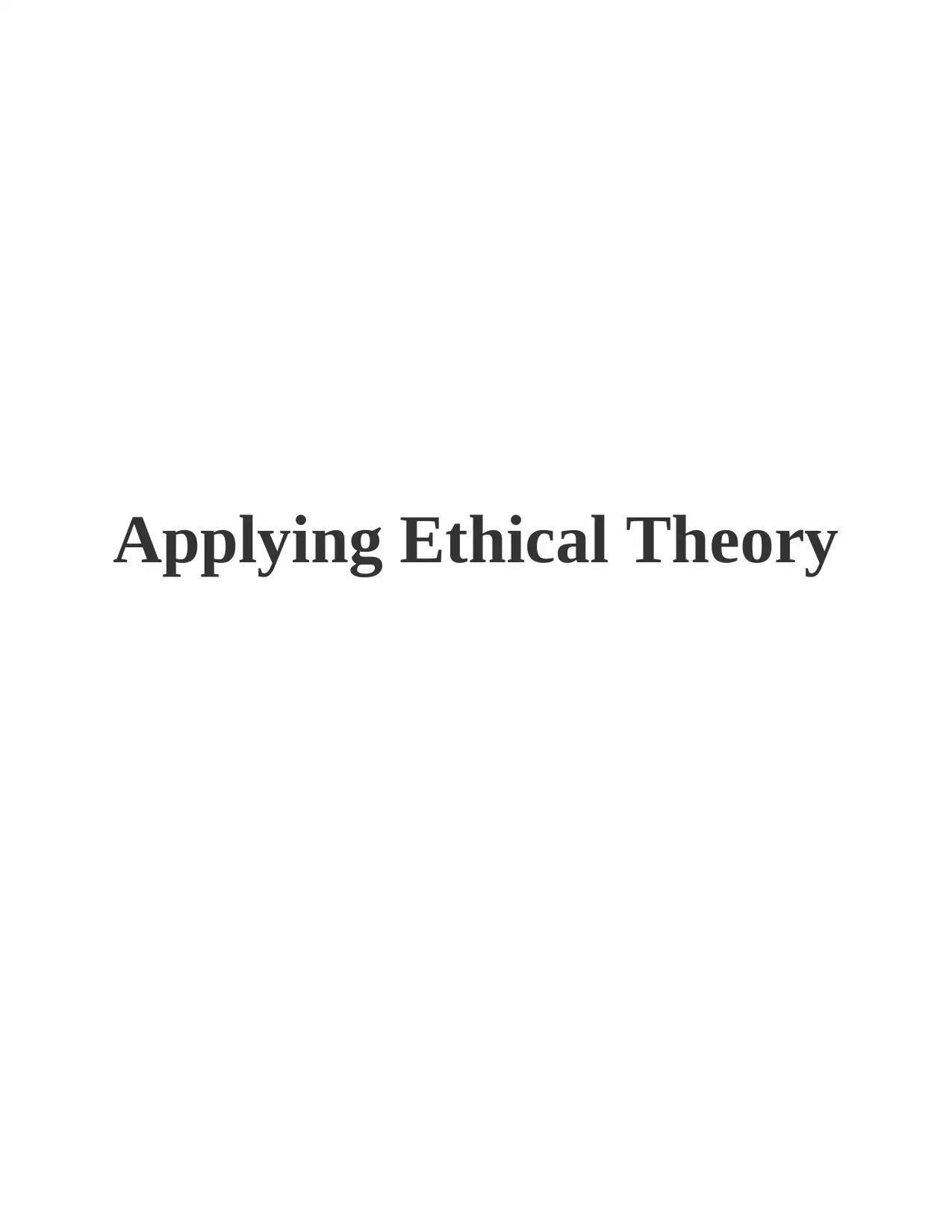
Applying Ethical Theory
Secure Best Marks with AI Grader
Need help grading? Try our AI Grader for instant feedback on your assignments.
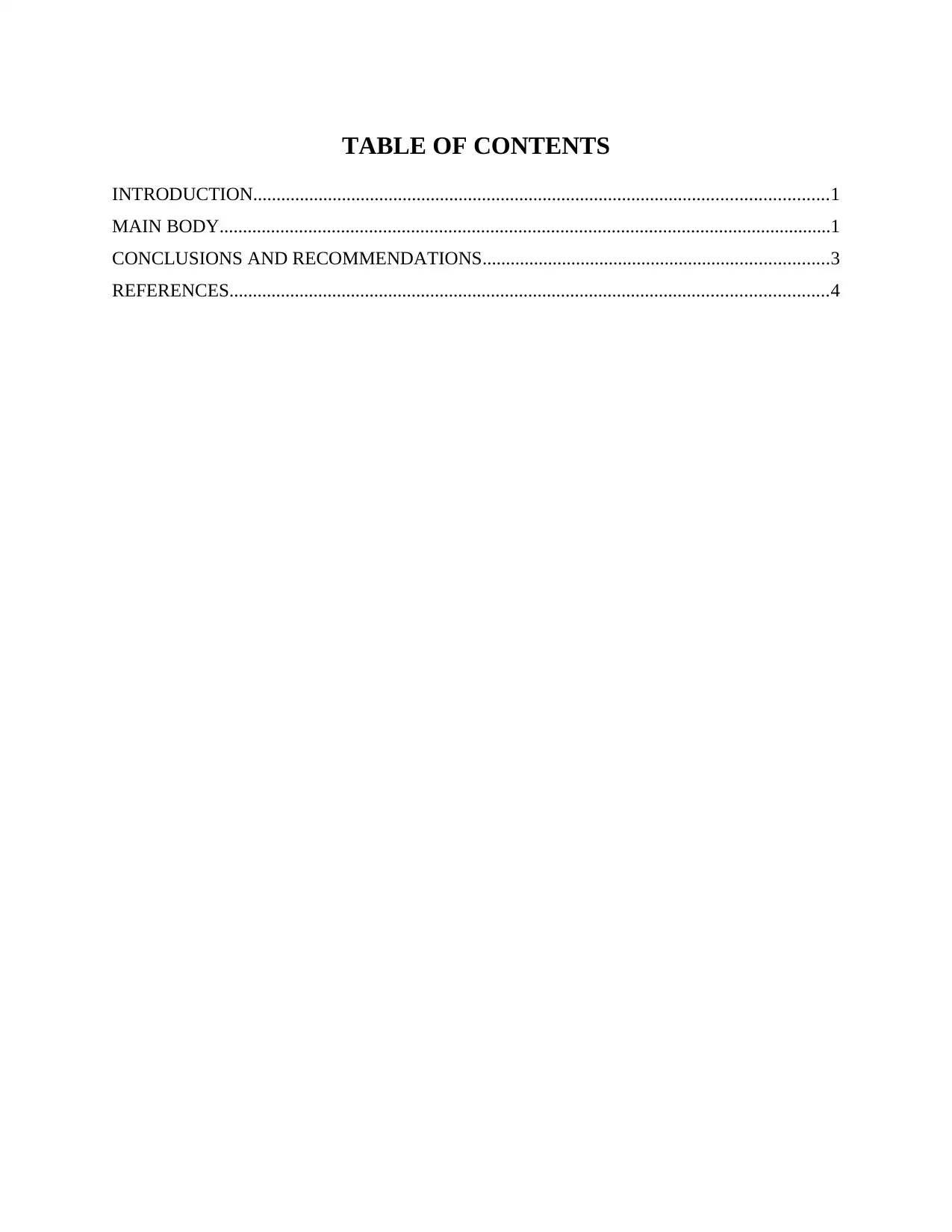
TABLE OF CONTENTS
INTRODUCTION...........................................................................................................................1
MAIN BODY...................................................................................................................................1
CONCLUSIONS AND RECOMMENDATIONS..........................................................................3
REFERENCES................................................................................................................................4
INTRODUCTION...........................................................................................................................1
MAIN BODY...................................................................................................................................1
CONCLUSIONS AND RECOMMENDATIONS..........................................................................3
REFERENCES................................................................................................................................4
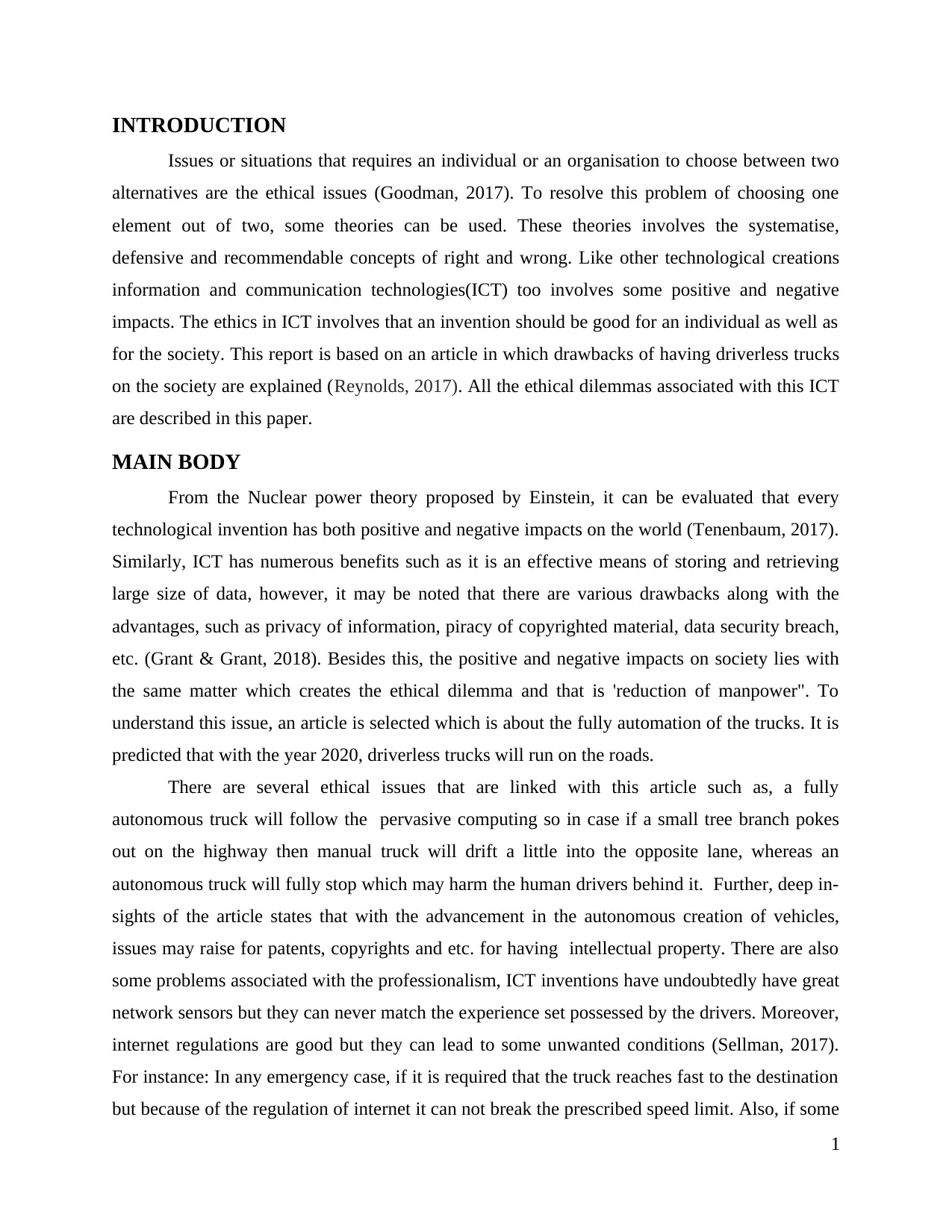
INTRODUCTION
Issues or situations that requires an individual or an organisation to choose between two
alternatives are the ethical issues (Goodman, 2017). To resolve this problem of choosing one
element out of two, some theories can be used. These theories involves the systematise,
defensive and recommendable concepts of right and wrong. Like other technological creations
information and communication technologies(ICT) too involves some positive and negative
impacts. The ethics in ICT involves that an invention should be good for an individual as well as
for the society. This report is based on an article in which drawbacks of having driverless trucks
on the society are explained (Reynolds, 2017). All the ethical dilemmas associated with this ICT
are described in this paper.
MAIN BODY
From the Nuclear power theory proposed by Einstein, it can be evaluated that every
technological invention has both positive and negative impacts on the world (Tenenbaum, 2017).
Similarly, ICT has numerous benefits such as it is an effective means of storing and retrieving
large size of data, however, it may be noted that there are various drawbacks along with the
advantages, such as privacy of information, piracy of copyrighted material, data security breach,
etc. (Grant & Grant, 2018). Besides this, the positive and negative impacts on society lies with
the same matter which creates the ethical dilemma and that is 'reduction of manpower". To
understand this issue, an article is selected which is about the fully automation of the trucks. It is
predicted that with the year 2020, driverless trucks will run on the roads.
There are several ethical issues that are linked with this article such as, a fully
autonomous truck will follow the pervasive computing so in case if a small tree branch pokes
out on the highway then manual truck will drift a little into the opposite lane, whereas an
autonomous truck will fully stop which may harm the human drivers behind it. Further, deep in-
sights of the article states that with the advancement in the autonomous creation of vehicles,
issues may raise for patents, copyrights and etc. for having intellectual property. There are also
some problems associated with the professionalism, ICT inventions have undoubtedly have great
network sensors but they can never match the experience set possessed by the drivers. Moreover,
internet regulations are good but they can lead to some unwanted conditions (Sellman, 2017).
For instance: In any emergency case, if it is required that the truck reaches fast to the destination
but because of the regulation of internet it can not break the prescribed speed limit. Also, if some
1
Issues or situations that requires an individual or an organisation to choose between two
alternatives are the ethical issues (Goodman, 2017). To resolve this problem of choosing one
element out of two, some theories can be used. These theories involves the systematise,
defensive and recommendable concepts of right and wrong. Like other technological creations
information and communication technologies(ICT) too involves some positive and negative
impacts. The ethics in ICT involves that an invention should be good for an individual as well as
for the society. This report is based on an article in which drawbacks of having driverless trucks
on the society are explained (Reynolds, 2017). All the ethical dilemmas associated with this ICT
are described in this paper.
MAIN BODY
From the Nuclear power theory proposed by Einstein, it can be evaluated that every
technological invention has both positive and negative impacts on the world (Tenenbaum, 2017).
Similarly, ICT has numerous benefits such as it is an effective means of storing and retrieving
large size of data, however, it may be noted that there are various drawbacks along with the
advantages, such as privacy of information, piracy of copyrighted material, data security breach,
etc. (Grant & Grant, 2018). Besides this, the positive and negative impacts on society lies with
the same matter which creates the ethical dilemma and that is 'reduction of manpower". To
understand this issue, an article is selected which is about the fully automation of the trucks. It is
predicted that with the year 2020, driverless trucks will run on the roads.
There are several ethical issues that are linked with this article such as, a fully
autonomous truck will follow the pervasive computing so in case if a small tree branch pokes
out on the highway then manual truck will drift a little into the opposite lane, whereas an
autonomous truck will fully stop which may harm the human drivers behind it. Further, deep in-
sights of the article states that with the advancement in the autonomous creation of vehicles,
issues may raise for patents, copyrights and etc. for having intellectual property. There are also
some problems associated with the professionalism, ICT inventions have undoubtedly have great
network sensors but they can never match the experience set possessed by the drivers. Moreover,
internet regulations are good but they can lead to some unwanted conditions (Sellman, 2017).
For instance: In any emergency case, if it is required that the truck reaches fast to the destination
but because of the regulation of internet it can not break the prescribed speed limit. Also, if some
1
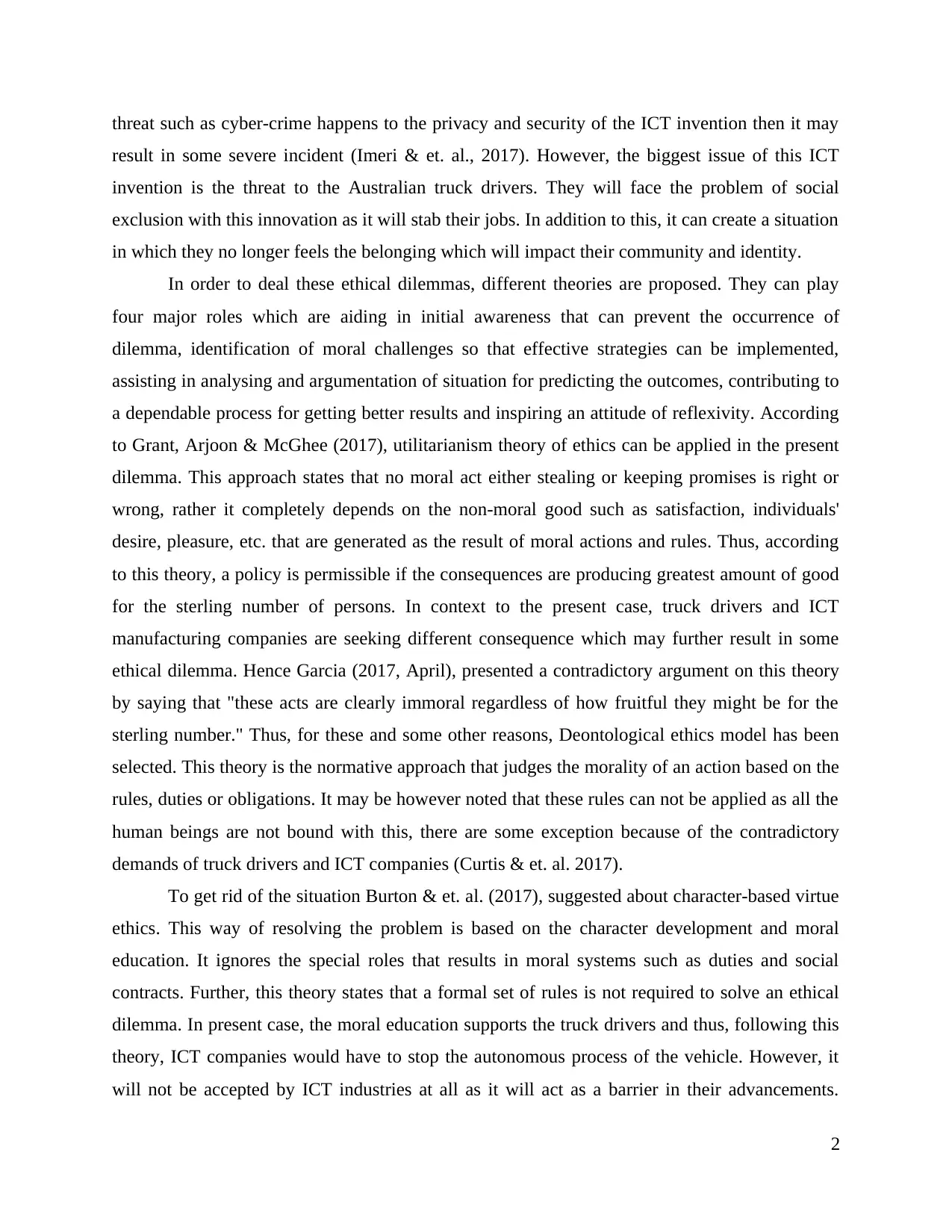
threat such as cyber-crime happens to the privacy and security of the ICT invention then it may
result in some severe incident (Imeri & et. al., 2017). However, the biggest issue of this ICT
invention is the threat to the Australian truck drivers. They will face the problem of social
exclusion with this innovation as it will stab their jobs. In addition to this, it can create a situation
in which they no longer feels the belonging which will impact their community and identity.
In order to deal these ethical dilemmas, different theories are proposed. They can play
four major roles which are aiding in initial awareness that can prevent the occurrence of
dilemma, identification of moral challenges so that effective strategies can be implemented,
assisting in analysing and argumentation of situation for predicting the outcomes, contributing to
a dependable process for getting better results and inspiring an attitude of reflexivity. According
to Grant, Arjoon & McGhee (2017), utilitarianism theory of ethics can be applied in the present
dilemma. This approach states that no moral act either stealing or keeping promises is right or
wrong, rather it completely depends on the non-moral good such as satisfaction, individuals'
desire, pleasure, etc. that are generated as the result of moral actions and rules. Thus, according
to this theory, a policy is permissible if the consequences are producing greatest amount of good
for the sterling number of persons. In context to the present case, truck drivers and ICT
manufacturing companies are seeking different consequence which may further result in some
ethical dilemma. Hence Garcia (2017, April), presented a contradictory argument on this theory
by saying that "these acts are clearly immoral regardless of how fruitful they might be for the
sterling number." Thus, for these and some other reasons, Deontological ethics model has been
selected. This theory is the normative approach that judges the morality of an action based on the
rules, duties or obligations. It may be however noted that these rules can not be applied as all the
human beings are not bound with this, there are some exception because of the contradictory
demands of truck drivers and ICT companies (Curtis & et. al. 2017).
To get rid of the situation Burton & et. al. (2017), suggested about character-based virtue
ethics. This way of resolving the problem is based on the character development and moral
education. It ignores the special roles that results in moral systems such as duties and social
contracts. Further, this theory states that a formal set of rules is not required to solve an ethical
dilemma. In present case, the moral education supports the truck drivers and thus, following this
theory, ICT companies would have to stop the autonomous process of the vehicle. However, it
will not be accepted by ICT industries at all as it will act as a barrier in their advancements.
2
result in some severe incident (Imeri & et. al., 2017). However, the biggest issue of this ICT
invention is the threat to the Australian truck drivers. They will face the problem of social
exclusion with this innovation as it will stab their jobs. In addition to this, it can create a situation
in which they no longer feels the belonging which will impact their community and identity.
In order to deal these ethical dilemmas, different theories are proposed. They can play
four major roles which are aiding in initial awareness that can prevent the occurrence of
dilemma, identification of moral challenges so that effective strategies can be implemented,
assisting in analysing and argumentation of situation for predicting the outcomes, contributing to
a dependable process for getting better results and inspiring an attitude of reflexivity. According
to Grant, Arjoon & McGhee (2017), utilitarianism theory of ethics can be applied in the present
dilemma. This approach states that no moral act either stealing or keeping promises is right or
wrong, rather it completely depends on the non-moral good such as satisfaction, individuals'
desire, pleasure, etc. that are generated as the result of moral actions and rules. Thus, according
to this theory, a policy is permissible if the consequences are producing greatest amount of good
for the sterling number of persons. In context to the present case, truck drivers and ICT
manufacturing companies are seeking different consequence which may further result in some
ethical dilemma. Hence Garcia (2017, April), presented a contradictory argument on this theory
by saying that "these acts are clearly immoral regardless of how fruitful they might be for the
sterling number." Thus, for these and some other reasons, Deontological ethics model has been
selected. This theory is the normative approach that judges the morality of an action based on the
rules, duties or obligations. It may be however noted that these rules can not be applied as all the
human beings are not bound with this, there are some exception because of the contradictory
demands of truck drivers and ICT companies (Curtis & et. al. 2017).
To get rid of the situation Burton & et. al. (2017), suggested about character-based virtue
ethics. This way of resolving the problem is based on the character development and moral
education. It ignores the special roles that results in moral systems such as duties and social
contracts. Further, this theory states that a formal set of rules is not required to solve an ethical
dilemma. In present case, the moral education supports the truck drivers and thus, following this
theory, ICT companies would have to stop the autonomous process of the vehicle. However, it
will not be accepted by ICT industries at all as it will act as a barrier in their advancements.
2
Secure Best Marks with AI Grader
Need help grading? Try our AI Grader for instant feedback on your assignments.
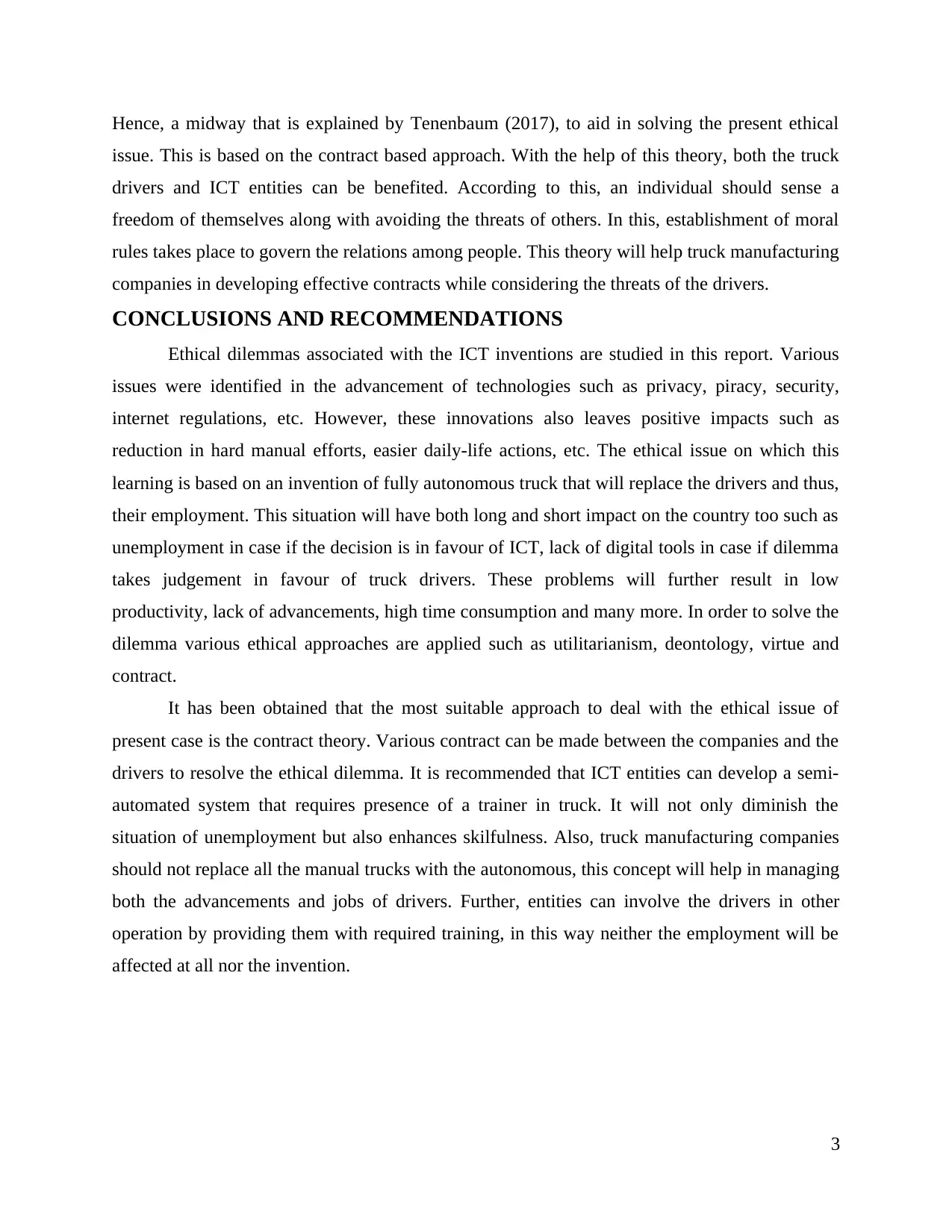
Hence, a midway that is explained by Tenenbaum (2017), to aid in solving the present ethical
issue. This is based on the contract based approach. With the help of this theory, both the truck
drivers and ICT entities can be benefited. According to this, an individual should sense a
freedom of themselves along with avoiding the threats of others. In this, establishment of moral
rules takes place to govern the relations among people. This theory will help truck manufacturing
companies in developing effective contracts while considering the threats of the drivers.
CONCLUSIONS AND RECOMMENDATIONS
Ethical dilemmas associated with the ICT inventions are studied in this report. Various
issues were identified in the advancement of technologies such as privacy, piracy, security,
internet regulations, etc. However, these innovations also leaves positive impacts such as
reduction in hard manual efforts, easier daily-life actions, etc. The ethical issue on which this
learning is based on an invention of fully autonomous truck that will replace the drivers and thus,
their employment. This situation will have both long and short impact on the country too such as
unemployment in case if the decision is in favour of ICT, lack of digital tools in case if dilemma
takes judgement in favour of truck drivers. These problems will further result in low
productivity, lack of advancements, high time consumption and many more. In order to solve the
dilemma various ethical approaches are applied such as utilitarianism, deontology, virtue and
contract.
It has been obtained that the most suitable approach to deal with the ethical issue of
present case is the contract theory. Various contract can be made between the companies and the
drivers to resolve the ethical dilemma. It is recommended that ICT entities can develop a semi-
automated system that requires presence of a trainer in truck. It will not only diminish the
situation of unemployment but also enhances skilfulness. Also, truck manufacturing companies
should not replace all the manual trucks with the autonomous, this concept will help in managing
both the advancements and jobs of drivers. Further, entities can involve the drivers in other
operation by providing them with required training, in this way neither the employment will be
affected at all nor the invention.
3
issue. This is based on the contract based approach. With the help of this theory, both the truck
drivers and ICT entities can be benefited. According to this, an individual should sense a
freedom of themselves along with avoiding the threats of others. In this, establishment of moral
rules takes place to govern the relations among people. This theory will help truck manufacturing
companies in developing effective contracts while considering the threats of the drivers.
CONCLUSIONS AND RECOMMENDATIONS
Ethical dilemmas associated with the ICT inventions are studied in this report. Various
issues were identified in the advancement of technologies such as privacy, piracy, security,
internet regulations, etc. However, these innovations also leaves positive impacts such as
reduction in hard manual efforts, easier daily-life actions, etc. The ethical issue on which this
learning is based on an invention of fully autonomous truck that will replace the drivers and thus,
their employment. This situation will have both long and short impact on the country too such as
unemployment in case if the decision is in favour of ICT, lack of digital tools in case if dilemma
takes judgement in favour of truck drivers. These problems will further result in low
productivity, lack of advancements, high time consumption and many more. In order to solve the
dilemma various ethical approaches are applied such as utilitarianism, deontology, virtue and
contract.
It has been obtained that the most suitable approach to deal with the ethical issue of
present case is the contract theory. Various contract can be made between the companies and the
drivers to resolve the ethical dilemma. It is recommended that ICT entities can develop a semi-
automated system that requires presence of a trainer in truck. It will not only diminish the
situation of unemployment but also enhances skilfulness. Also, truck manufacturing companies
should not replace all the manual trucks with the autonomous, this concept will help in managing
both the advancements and jobs of drivers. Further, entities can involve the drivers in other
operation by providing them with required training, in this way neither the employment will be
affected at all nor the invention.
3
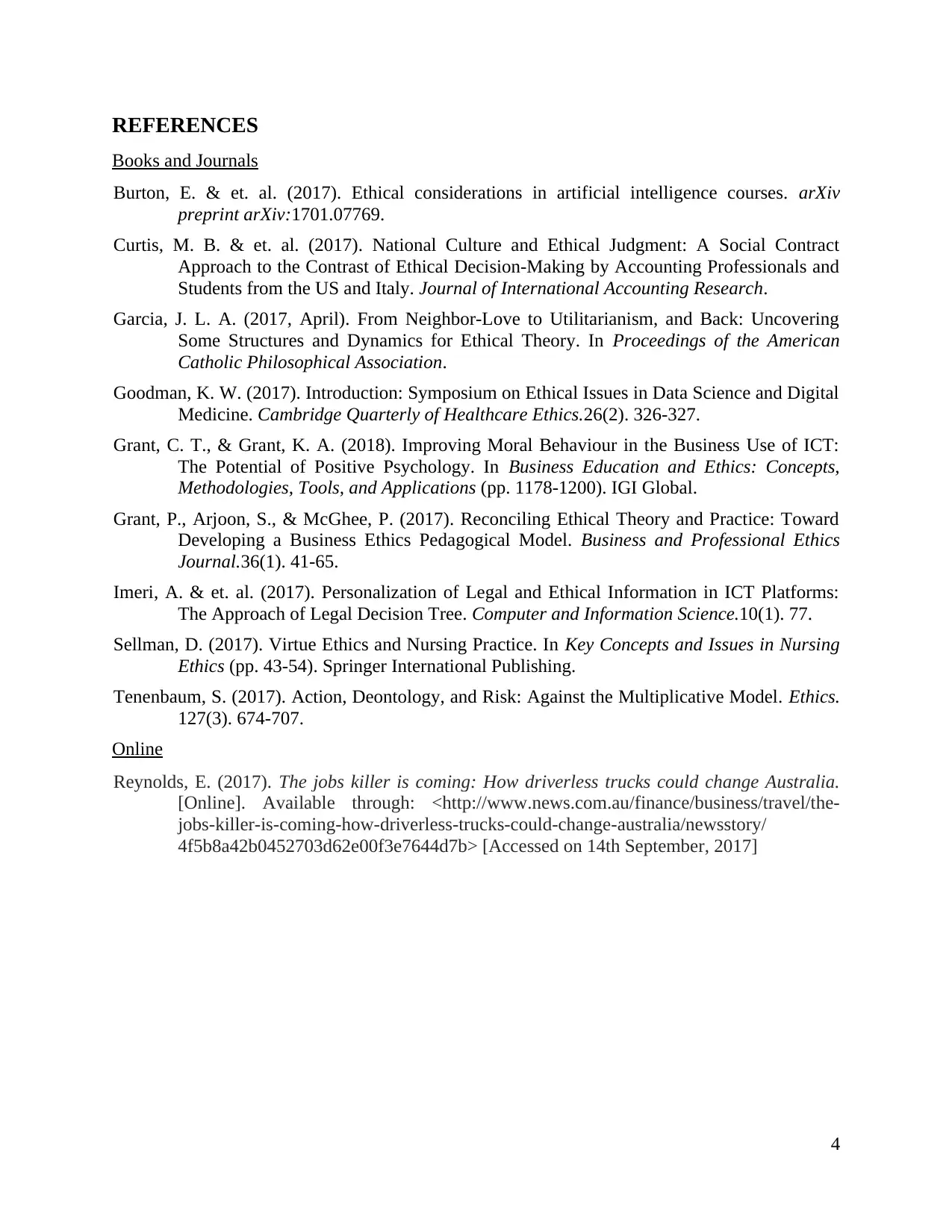
REFERENCES
Books and Journals
Burton, E. & et. al. (2017). Ethical considerations in artificial intelligence courses. arXiv
preprint arXiv:1701.07769.
Curtis, M. B. & et. al. (2017). National Culture and Ethical Judgment: A Social Contract
Approach to the Contrast of Ethical Decision-Making by Accounting Professionals and
Students from the US and Italy. Journal of International Accounting Research.
Garcia, J. L. A. (2017, April). From Neighbor-Love to Utilitarianism, and Back: Uncovering
Some Structures and Dynamics for Ethical Theory. In Proceedings of the American
Catholic Philosophical Association.
Goodman, K. W. (2017). Introduction: Symposium on Ethical Issues in Data Science and Digital
Medicine. Cambridge Quarterly of Healthcare Ethics.26(2). 326-327.
Grant, C. T., & Grant, K. A. (2018). Improving Moral Behaviour in the Business Use of ICT:
The Potential of Positive Psychology. In Business Education and Ethics: Concepts,
Methodologies, Tools, and Applications (pp. 1178-1200). IGI Global.
Grant, P., Arjoon, S., & McGhee, P. (2017). Reconciling Ethical Theory and Practice: Toward
Developing a Business Ethics Pedagogical Model. Business and Professional Ethics
Journal.36(1). 41-65.
Imeri, A. & et. al. (2017). Personalization of Legal and Ethical Information in ICT Platforms:
The Approach of Legal Decision Tree. Computer and Information Science.10(1). 77.
Sellman, D. (2017). Virtue Ethics and Nursing Practice. In Key Concepts and Issues in Nursing
Ethics (pp. 43-54). Springer International Publishing.
Tenenbaum, S. (2017). Action, Deontology, and Risk: Against the Multiplicative Model. Ethics.
127(3). 674-707.
Online
Reynolds, E. (2017). The jobs killer is coming: How driverless trucks could change Australia.
[Online]. Available through: <http://www.news.com.au/finance/business/travel/the-
jobs-killer-is-coming-how-driverless-trucks-could-change-australia/newsstory/
4f5b8a42b0452703d62e00f3e7644d7b> [Accessed on 14th September, 2017]
4
Books and Journals
Burton, E. & et. al. (2017). Ethical considerations in artificial intelligence courses. arXiv
preprint arXiv:1701.07769.
Curtis, M. B. & et. al. (2017). National Culture and Ethical Judgment: A Social Contract
Approach to the Contrast of Ethical Decision-Making by Accounting Professionals and
Students from the US and Italy. Journal of International Accounting Research.
Garcia, J. L. A. (2017, April). From Neighbor-Love to Utilitarianism, and Back: Uncovering
Some Structures and Dynamics for Ethical Theory. In Proceedings of the American
Catholic Philosophical Association.
Goodman, K. W. (2017). Introduction: Symposium on Ethical Issues in Data Science and Digital
Medicine. Cambridge Quarterly of Healthcare Ethics.26(2). 326-327.
Grant, C. T., & Grant, K. A. (2018). Improving Moral Behaviour in the Business Use of ICT:
The Potential of Positive Psychology. In Business Education and Ethics: Concepts,
Methodologies, Tools, and Applications (pp. 1178-1200). IGI Global.
Grant, P., Arjoon, S., & McGhee, P. (2017). Reconciling Ethical Theory and Practice: Toward
Developing a Business Ethics Pedagogical Model. Business and Professional Ethics
Journal.36(1). 41-65.
Imeri, A. & et. al. (2017). Personalization of Legal and Ethical Information in ICT Platforms:
The Approach of Legal Decision Tree. Computer and Information Science.10(1). 77.
Sellman, D. (2017). Virtue Ethics and Nursing Practice. In Key Concepts and Issues in Nursing
Ethics (pp. 43-54). Springer International Publishing.
Tenenbaum, S. (2017). Action, Deontology, and Risk: Against the Multiplicative Model. Ethics.
127(3). 674-707.
Online
Reynolds, E. (2017). The jobs killer is coming: How driverless trucks could change Australia.
[Online]. Available through: <http://www.news.com.au/finance/business/travel/the-
jobs-killer-is-coming-how-driverless-trucks-could-change-australia/newsstory/
4f5b8a42b0452703d62e00f3e7644d7b> [Accessed on 14th September, 2017]
4
1 out of 6
Your All-in-One AI-Powered Toolkit for Academic Success.
+13062052269
info@desklib.com
Available 24*7 on WhatsApp / Email
![[object Object]](/_next/static/media/star-bottom.7253800d.svg)
Unlock your academic potential
© 2024 | Zucol Services PVT LTD | All rights reserved.



